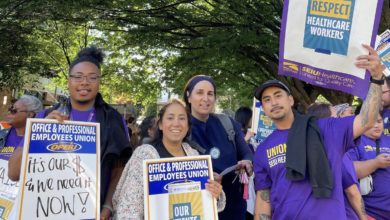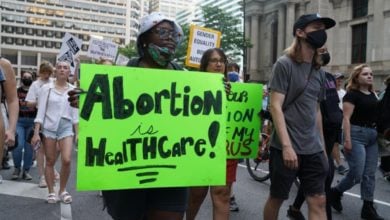The writer is a Registered Nurse in Los Angeles, California.
California governor Arnold Schwarzenegger’s latest foray into public policy includes a promise to reform healthcare in California. He claims it will lead to coverage for all. After previously making the bashing of nurses a central part of his program in his assaults on organized labor, he now proclaims his desire to provide healthcare to all Californians.
In reality, his proposal contains nothing new for millions of workers in California. It only shuffles around some of the
 |
While labeling his plan as “universal healthcare,” it is not.
The plan mandates that every individual in California must carry health insurance. There is no requirement that it be affordable or comprehensive.
For example, a family of four with an income of $50,000 would still have to spend 6 percent of their income on healthcare. In fact, most families would only be able to afford a basic no-frills policy that would include a $5,000 deductible and up to $7500 for out-of-pocket expenses not covered in the policy. No dental, eye care or mental health would be covered.
The insurance companies, already guilty of jacking-up prices and cutting off coverage for seriously ill patients, would be given the power determine how much insurance would cost, allowing them to increase costs for the consumers each year.
‘Healthcare for all’
Rather than a single-payer system—where all services are covered, where the patient never even sees the bill, where all are welcome—the current Schwarzenegger plan requires each person to be responsible for obtaining insurance. Despite the fact that a single-payer plan for universal care on demand would be more efficient and less costly, Schwarzenegger’s plan maintains the ability of HMOs and pharmaceuticals and other parasitic enterprises—billing companies, managed care consultants and so on—to continue to force prices upward for employers, doctors, hospitals and individuals.
Although the governor claims to call for universal coverage for all children in California, there are provisions in the proposal that include a “modified” community rating system. This would allow private insurance companies to differentiate in premiums on the bases of age, gender and location, charging residents in poor areas more than those in gentrified areas.
The proposal also relies heavily on federal government subsidies to sustain itself. It is highly unlikely that Congress or the president would approve a budget that focuses on human needs rather than war and tax breaks for the rich.
The money to pay for universal single-payer healthcare is already there. Current studies by state senator Sheila Kuehl demonstrate in precise figures that there is sufficient money in California to pay for universal healthcare for all. Kuehl’s studies conclude that, in fact, costs would be reduced greatly at no expense to taxpayers, hospitals and providers.
By eliminating the morass of HMO costs, billing agencies, unbridled price gouging by pharmaceutical companies, the average cost of medical care in California—amounting to an average of about $6,000 per person—would be greatly reduced by adopting a single-payer government plan. Under a single-payer plan, all services would be provided to all without any cost to the patient.
Fundamentally, the governor’s plan perpetuates the profit system mode of health care that enriches the wealthy and pushes ordinary workers and their families into deeper poverty due to catastrophic medical bills, co-pays and impossible deductibles. A high percentage of bankruptcy filings in the United States are due to people’s inability to pay catastrophic medical bills.
Schwarzenegger’s proposal—rather than solving the problem of profits inside the business of providing healthcare to all as a fundamental human right—really increases capacity of HMOs, giant price-gouging pharmaceuticals and others to increase profits at the expense of community health.
The time has come for a broad movement demanding free universal healthcare for all, regardless of employment or physical, mental or immigration status. In the face of a militant united movement, forcing such a concession from the capitalists is very possible at this time.






